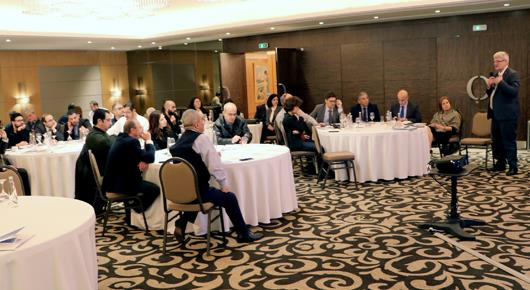FAO shares on-going progress in water resources management with stakeholders

Within the project “Improved Water Resources Monitoring System/Integrated Water Resources Management at regional level in Lebanon” funded by the Swiss Embassy, the Food and Agriculture Organization of the United Nations (FAO), in collaboration with the Ministry of Energy and Water (MoEW) and the North Lebanon Water Establishment (NLWE) organized a platform meeting on February 25, 2020.
The meeting aimed at presenting the ongoing outputs of the project to stakeholders in the country and at showing the on-going progress of the project and the way forward.
It took place in the presence of Mr. Maurice Saade, FAO Representative in Lebanon, Mr. Khaled Obeid, Director General of the North Lebanon Water Establishment (NLWE) and Mr. Philipp Buetler, Head of International Cooperation at the embassy of Switzerland in Lebanon. Representatives from the Ministry of Energy and Environment, the Ministry of Agriculture, the North Lebanon Water Establishment (NLWE), the Litani River Authority, and representatives from NGOs, INGOs, and UN agencies also participated in the meeting.
“This impressive number of participants urge us to increase our efforts in sharing our acquired knowledge through this project,” said Mr. Saade.
For Mr. Obeid, this project is a new start and it paves the way to dealing with new projects differently.
Mr. Buetler believed that this platform meeting aims at discovering more and new synergies and complementarities in the project.
Funded by the Government of the Swiss Confederation, the project focuses on the monitoring of water resources to improve data availability, raising the capacity of water establishment personnel as well as farmers, and, thereby, providing the basis for informed decision-making power to be transferred to end-users to contribute to raising water productivity and improving water quality.
FAO, in collaboration with the private sector, has established fifty monitoring locations in Mhamara, Bebnine, and Menieh in North Lebanon, in Nahr El-Bared Watershed. Thirty of these locations have been supplied with monitoring equipment that ranges from Parshall flumes, gauges and bar screens. In the other twenty locations, data loggers have been installed with their sensors to capture and record real-time water discharge.
At the same time, the NLWE is provided with a capacity-building program on the operation and maintenance of the monitoring system along with the relevant procedures of data collection.
FAO, in collaboration with the National Council for Scientific Research (CNRS), has also developed a remote sensing-based water accounting tool at a regional level. This tool allows the monitoring of Land-cover/Land-use maps through remote sensing and generates information regarding soil moisture, vegetation state, leaf area index, biomass production, and evapotranspiration.
At a later stage, this information will feed into the SCADA system that will be installed to generate irrigation water accounting information to support decision-making and efficient water management.
In this context, FAO will organize capacity-building training for the NLWE staff to operate and analyze the produced maps and reports.
In relation to water quality monitoring, laboratories in Menieh, Halba, Sir Al Dineyeh, and the Tripoli central laboratories have been supplied with the needed material and equipment for proper irrigation water quality testing.
In parallel, FAO trained laboratory technicians on various parameters of irrigation water testing and analysis that should be regularly. A water collection protocol has also been developed and will be shared with Laboratory staff as a reference for optimal practices.
In addition, a total of fifteen plot trials have been already selected, diagnosed and benchmarked. A set of recommended optimal agricultural practices to enhance water productivity has been established and is currently being implemented on-farm level. At this phase and with the support of MoA, agricultural practices at the farm level are being applied and knowledge has been transferred to farmers to enhance water productivity, thus increase food production and food security.
